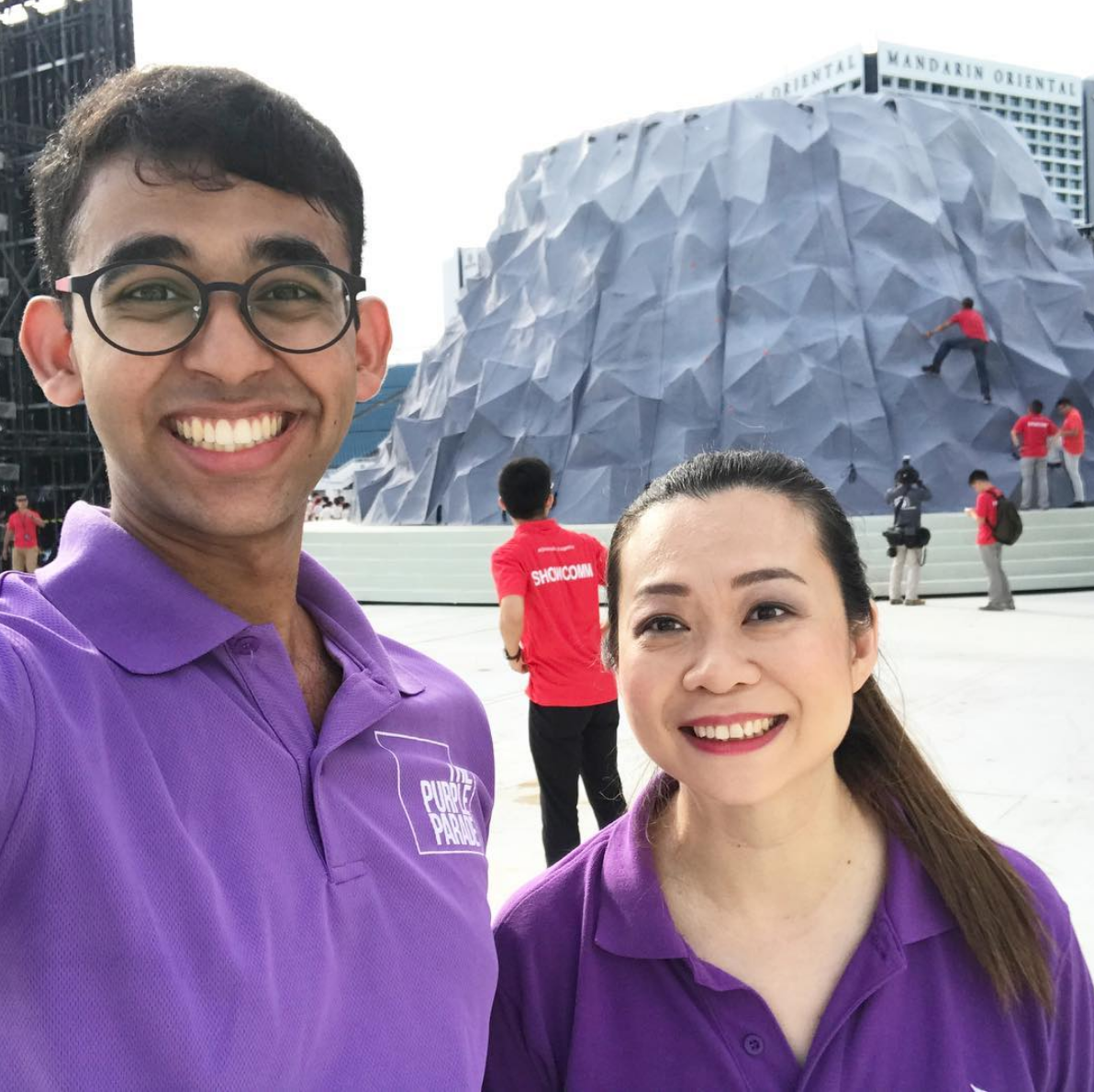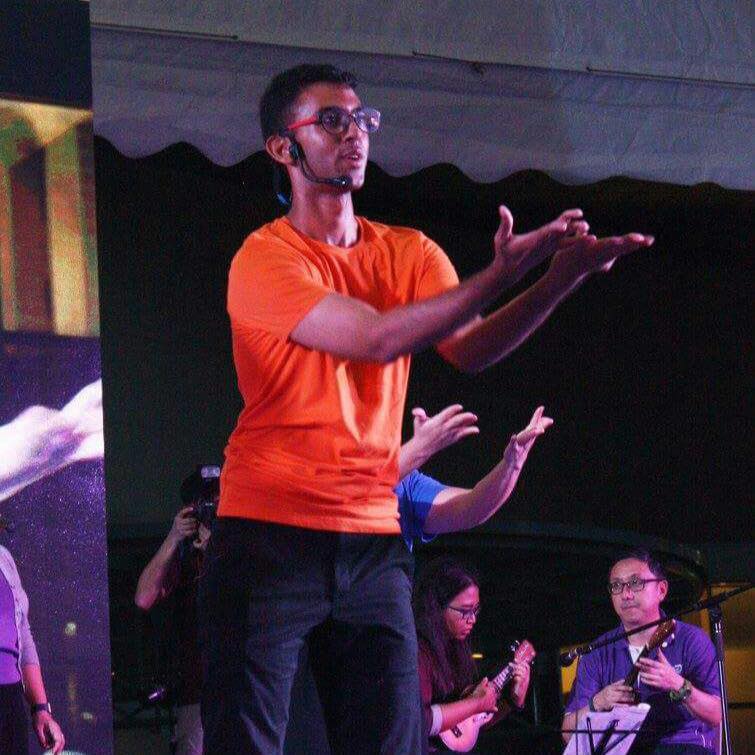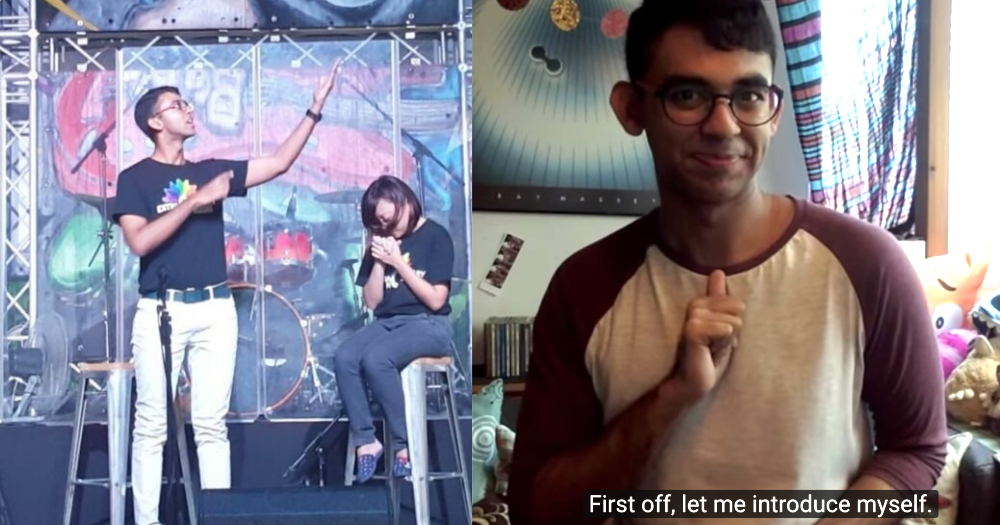23-year-old Arjun Vadrevu came across as a real impressive interpreter to me in Aug. 2019, when he signed to the song pieces performed by The Purple Symphony.
The Purple Symphony is Singapore’s largest inclusive orchestra, consisting of musicians with and without special needs.
His role was not only to make sense of the lyrics for the Deaf, but for them to be truly immersed in the atmosphere of a song through his facial expressions and gestures.
That said, Arjun's song-signing ability probably stood out to the rest of the audience, as he signed passionately to the portions with only instrumentals.
More than words
During the performance, Arjun gestured to the audience expressively, down to the smallest details such as acting out the descending chime sound for the song “When You Believe”.
It surprised me, as I thought sign language is simply a translation of words.
In an email interview with Mothership.sg, Arjun explained,
“In a song like “When You Believe”, the lyrics are certainly moving, but so are the musical interludes. So as an interpreter, my job is to interpret these segments of lyric-less music as well, so Deaf audience members can get the same experience and feel the same things as their hearing counterparts.”
Indeed, song signing is more than just a direct translation.
As such it actually takes much more effort and time than one might imagine to prepare for a song interpretation.
Song signing is more complex than interpretation
Arjun shared that interpreters have quite a few things to consider, to ensure that they express the essence and the attitude of the song accurately.
"Technically, I could interpret any song. However, that does not mean if you give me a song, I would be able to perform on the spot. Sure, I would be able to interpret it in Sign Language, but it would not be proper song signing.
I would not have had time to consider things like rhyme or rhythm. Furthermore, metaphors or images in one language do not always make sense in another."
He added:
"For example, in the song "I Don’t Care", lyrics include “don’t think I fit in” and “maybe I am somebody”. Of course we all understand what these phrases mean in English, but try directly (word-for-word) translating them into any other language, and suddenly they no longer make sense. (I might choose to, instead, interpret “fit in” as “belong”, and “somebody” as “important”.) "
"Song signing is basically a performance"
For songs with various versions, it is important to consider the translations, as they can lead to very different outcomes.
Arjun shared one such example.
"For example, in the National Day song "Singapura, Oh Singapura", the English lyrics go “sunny island set in the sea”, which sounds sweet and fun, but a bit childish.
In contrast, the original Malay version is “saya hormat selamanya”, which means “I respect [Singapore] forever”, conveying a much deeper sentimental message. "
And it can require a fair bit of acting chops at times, as they could invent stories to embody the message the song might convey.
"Song signing is basically a performance, " Arjun summarised.
This was the reason why he needed a few weeks to prepare for the concert by The Purple Symphony, as he had to fully understand the songs and think about how to interpret them accurately, effectively and artistically.
If you don’t use it, you lose it
With such deep insights into sign language, one might be surprised that Arjun only picked up sign language in 2016.
Back then, he decided to learn sign language as he thought it would open new avenues for volunteering, community engagement, and work.
Most importantly, he wished to continue to serve those with special needs while performing his National Service, as he had some prior volunteering experience at Pathlight School and Grace Orchard School.
He eventually started lessons at a social enterprise called ExtraOrdinary Horizons (EOH), founded by a Deaf multi-hyphenate Lily Goh, in 2016.
 Arjun and Lily Goh at National Day Parade 2017. Photo from Arjun's Instagram.
Arjun and Lily Goh at National Day Parade 2017. Photo from Arjun's Instagram.
By the end of that year, he was already able to interpret in “casual situations”. It's a testament to his drive that he continues to actively seek ways to hone his skills.
Arjun shared that he firmly believes in the phrase “If you don’t use it, you lose it”. So, he made use of opportunities in everyday life to practice sign language.
These include interpreting the TV shows he watches, finding events to meet new Deaf friends to practice sign language with, and even creating a YouTube channel called ‘Itchy Fingers’:
In addition, Arjun also volunteers at large-scale events like the National Day Parade, Pink Dot and The Purple Symphony.
2019 marked his third year at The Purple Symphony.
 Arjun interpreting 'True Colours' at Purple Parade in 2016. Photo courtesy of Central Singapore Community Development Council.
Arjun interpreting 'True Colours' at Purple Parade in 2016. Photo courtesy of Central Singapore Community Development Council.
https://www.instagram.com/p/BWFYCjxABc9/
Gained a family of diversity and inclusivity
Arjun shared how the past four years of study and volunteering have taught him useful skills, such as better understanding linguistics and becoming a better performer, as he has a better sense of his facial expressions and body language.
But during his experience, he gained much more than a skillset.
He also found a family in those who dedicate their time each year in The Purple Symphony. Said Arjun:
"The Purple Symphony is, very simply, a family. The relationships I have formed with the Central Singapore CDC staff and the musicians are definitely the biggest reason for me coming back and working with them each year."
I also enjoyed watching the musicians help each other out, practicing together and forming bonds that would last long beyond any given performance. Being able to meet and interact with so many new faces is definitely a chance I would not have given up."
But perhaps the most important of all was gaining awareness and deepening his empathy for people with disabilities:
"But most importantly, I am more aware now, and advocate more strongly for inclusion in our society.
As an ally to the cause for Sign Language, Deaf and disabled peoples’ rights, I am also understanding how to better be an ally, ensuring I use privileges I have to extend the platforms available to me to historically marginalised communities, in this case, supporting Deaf-lead projects and movements.
I am so glad I attended that first introductory workshop at EOH; it really did set me on a path that would come to impact all aspects of my life."
Top photo collage from Arjun's Instagram and courtesy of Central CDC
If you like what you read, follow us on Facebook, Instagram, Twitter and Telegram to get the latest updates.
